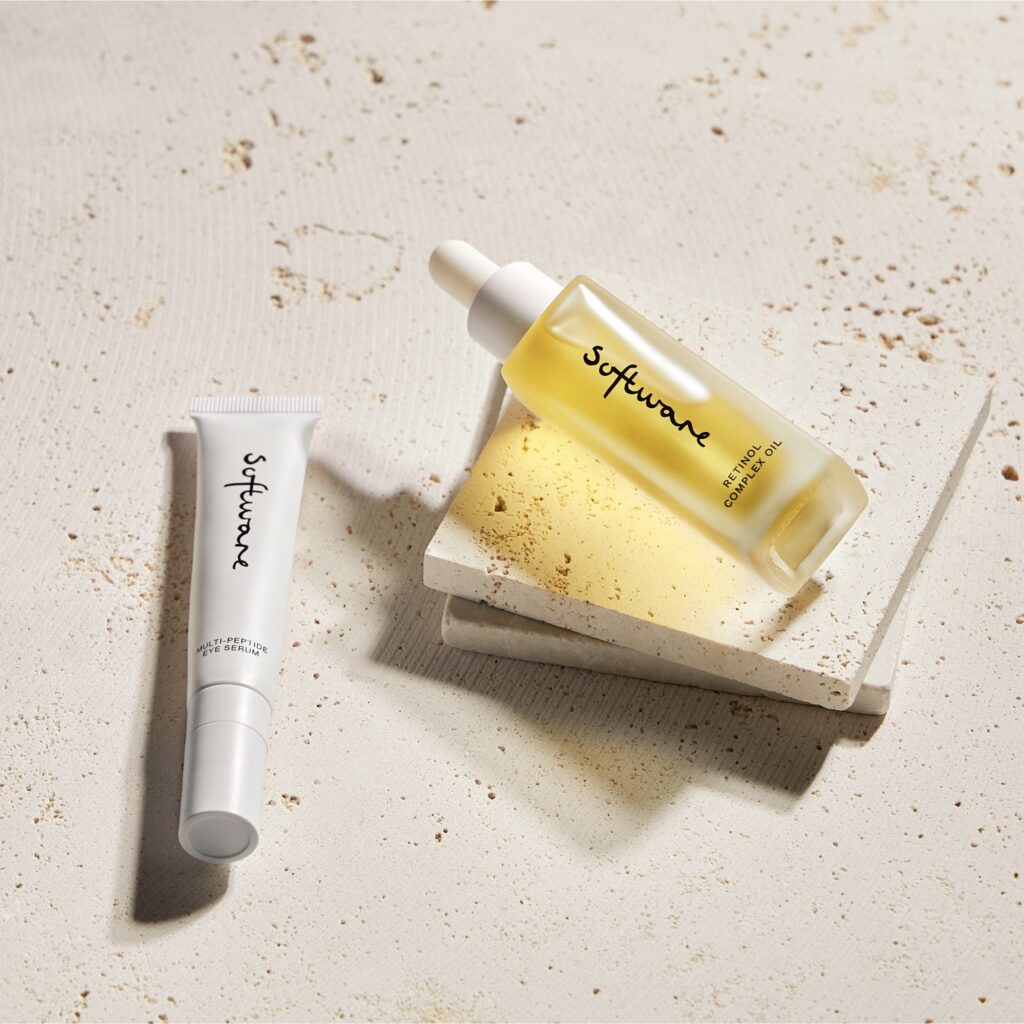We all have our favourite skincare products that we purchase time and time again. And others that probably gather dust on the bathroom shelf for a little too long. But does skincare expire and how are you supposed to know when it’s time to toss it? And can using expired skin care harm your skin?
We spoke to Dr Lauren Thomas, skin specialist and doctor at Software, all about skincare expiration and how to ensure you’re treating your skin right. Let’s get into it.
Can skincare expire?
In short, yes. Skincare can expire. However, the full answer is a little more complicated.
But if skincare products expire, you might be wondering the following question.
Why don’t my skincare products have an expiration date?
According to the TGA, “Cosmetics are intended to be used on the body or in the mouth, and their promotional claims are limited to those that are consistent with the meaning and intent of changing the body’s odour or appearance, cleansing it, keeping it in good condition or protecting it.”
In other words, products that aren’t ingested and are used to enhance your body’s natural appearance.
“Therapeutic goods generally make claims that represent them to be, or likely to be, for therapeutic purposes, which includes use in or in connection with preventing, diagnosing, curing or alleviating a disease, ailment or defect or influencing, inhibiting or modifying a physiological process in persons.”
This includes things like medication, supplements, sunscreens and skin care products that advertise the product’s ability to treat certain skin conditions such as acne, eczema, rosacea and/or scarring. These are classified as therapeutic goods and so would be required by law to display an expiry date on the product.
As explained by Dr Lauren, “Skincare products that fall under the cosmetics category are not subject to regulation by the TGA, and because of this companies are legally not required to list expiration dates.”
Note that products from overseas may have expiry dates as they are bound by different laws.
How to know if a product is cosmetic or therapeutic?
While a fine line, it’s important to understand the difference if you’re trying to find the expiration date of certain products in your skincare routine.
Some questions to consider if you’re unsure if a product is purely cosmetic or not are:
- Does the product claim to change look or appearance, such as by adding colour or smoothing skin texture by adding a layer of product? It’s probably cosmetic in this case
- Does the product claim to change an underlying physiological process to achieve a different appearance? This might be a therapeutic product and should have an expiry date somewhere on the packaging.
Consider the following examples as comparisons of similar claims made about a cosmetic product vs a therapeutic good:
- ‘Helps your skin look even and smooth’ (cosmetic — changing its appearance) vs ‘Reduces skin pigmentation and uneven skin tone’ (therapeutic good — physiological change)
- ‘Helps skin look firm’ (cosmetic — changing its appearance) vs ‘Improves skin’s internal structure for firmer skin’ (therapeutic good — physiological change).
How to know when my skincare has expired?
“Typically, cosmetic companies want their products to have a long shelf life. Generally, cosmetic products are considered safe to use for around 2-3 years,” says Dr Lauren.
However, the way you use a product can also affect a product’s shelf life.
Here are some considerations you might want to be aware of:
- Is this product coming into contact with my skin directly? — Using things like lipsticks, eyeliners, and mascara can introduce certain bacteria into the product itself and cause it to spoil sooner
- Am I putting my fingers in the product to apply it — for example, facial or body moisturisers in pots or tubs?
- Do you use a brush to apply the product? If so, how often is the brush being washed and how is it being washed?
- Does the product contain natural ingredients, including water (creams, etc)?
Look for physical changes like:
- Change in smell
- Change in colour
- Change in consistency — has it dried out, making it difficult to apply, has it become more watery or grainy or is the product separating?
While products might not have expiration dates, there are other things to look out for.
“Instead of having an expiry date printed on the packaging, there may be a PAO symbol instead. This looks like an open jar, with a number on it, followed by an M. PAO stands for Period After Opening, so if the container has 12M on it, it means you should throw it away 12 months after opening.
“Occasionally the PAO or expiry date may be printed on the box and not the tube or bottle. So, it can be worthwhile writing the expiry date down along with the date you opened it, with a permanent marker onto the product itself,” says Dr Lauren.
What about skincare with active ingredients?
“Products that contain plant extracts, antioxidants or other actives such as retinol, will start to oxidise or deteriorate over time, meaning they will not be as effective.
“Exposure to excessive heat, moisturise, humidity, light and bacteria will make products reach the end of their lifespan sooner rather than later,” explains Dr Lauren.
Can using expired skincare products be harmful?
Any opened product is susceptible to bacteria. While no one likes the idea of throwing away unused products, it might be saving your skin a great deal of harm.
According to consumer advocate, CHOICE, using expired skincare products could lead to:
- Breakouts
- Redness/irritation
- Itchiness
- Inflammation/swelling
- More serious reactions such as dermatitis or infection.
But what’s the risk of this happening? According to Dr Lauren, it’s all about chemical composition – specifically the water content of the product.
“If cream-containing products begin to grow bacteria this may lead to skin irritation or infections. Occasionally products may need to be tossed early. You should do this if you’ve used a product and then later that day, realise you have an infection, for example, a cold sore, conjunctivitis or a skin infection,” explains Dr Lauren.
How to make your skincare products last longer
Here are a few pointers for extending the shelf life of your products:
- Don’t store your products on the windowsill or in direct sunlight
- Don’t leave products in a hot car
- Place caps and lids firmly back on after use
- If the product is in a jar or tub, use a clean stick (small spatula/knife/spoon/make-up brush) to pick up the product instead of your fingers
- Don’t share lipsticks or mascara with others (or any items that come into direct contact with the skin), especially if you have sensitive skin.
Can using a beauty fridge extend the shelf life of your skincare?
Beauty fridges have become increasingly popular in the last few years, but do they really work?
“While beauty fridges are not as cold as regular food fridges, they keep products at a more stable temperature. If you keep your products in a normal fridge, the back and forth going from very hot to very cold from opening and closing can put your products under a lot of stress, especially products containing water and oil. These products contain emulsifiers to keep ingredients mixed together, when exposed to different temperature changes these emulsifiers work at double time, and may spoil faster,” says Dr Lauren.
Keeping products such as face masks and eye creams can be soothing and reduce any puffiness or redness you may be experiencing.
However, it’s not recommended that all products be kept in a beauty fridge.
What products can be kept in a beauty fridge?
“Liquid, cream and gel-based products can be kept in a beauty fridge. Oil-based products should be kept at room temperature as otherwise they can congeal or get chunky. Powder-based cosmetics or products with a high wax content (e.g., lipsticks, certain foundations) should be kept at room temperature,” explains Dr Lauren.
What can go in the beauty fridge:
- Eye creams
- Serums
- Sheet masks
- Toners
- Facial mists
- Moisturiser
- Nail polish
What to keep out of the beauty fridge:
- Lipsticks
- Oil-based products (primers, face and hair oils)
- Sunscreen
- Pressed powders (eye shadows, foundation mineral powder)
- Concealer or foundation
While not all beauty products have obvious expiry dates, the guidelines above should help you get the most bang for your buck out of your skincare products and help you keep track of their expiration dates.
Learn more about skincare expiration dates below.
Not sure what beauty products to invest in? Read our winter skincare edit here.





